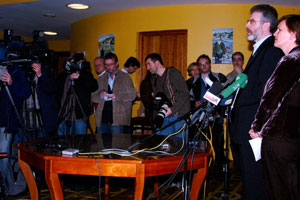18 January 2007 Edition
Leadership refuses to put head down on policing

Facing the press after last Saturday’s Sinn Féin Ard Chomhairle meeting
BY SEÁN Mac BRÁDAIGH
Against a backdrop of DUP bad faith, a critically low level of Irish Government engagement and a British Government who have pandered to DUP intransigence, the leadership of Sinn Féin met for the second time in three weeks to chart a way forward on the policing issue.
From an early point at last Saturday’s Sinn Féin Ard Chomhairle meeting, Party President Gerry Adams made clear that he was not for putting his head down on policing. The point was made that the republican struggle was stronger than at any time in recent memory and that republicans had not reached that point by “putting our head in the sand on any issue”.
Concern was expressed at the meeting over the increasing evidence of division within the DUP and that that party’s positioning was hardening all the time. Several speakers voiced the opinion that the ‘refuseniks’ were winning the internal DUP battle. However, nobody who spoke was under any illusion that DUP obstructionism was solely or even primarily about policing – it was rather about a refusal to share power with republicans. Blair’s attitude to the DUP was deplored, but again there was no naivety about the position of a British Government which remains unionist.
While some members expressed concern that proceeding with the Ard Fheis would be misinterpreted as a sign of weakness in the face of DUP obduracy, more believed it would rob unionist rejectionsists of an excuse for doing nothing.
Role of Irish Government
Concern at the level of involvement by the Irish Government was raised and the point was made that the surest way to force it to be pro-active was by enlisting the broad weight of nationalist opinion.
Everyone at the meeting was conscious of the need for cohesion and unity within republican ranks. Eamonn Nolan felt that when republicans argue matters out, they are at their best. “Contact, communication and discussion are very important”, he said.
Several speakers referred to there being three legs to the stool which was the motion passed by the previous Ard Chomhairle meeting. One leg – a positive DUP response – had since been taken away, but most felt that the special Ard Fheis must go ahead for reasons of republican strategy, the needs of the peace process and because policing was a key issue of concern for those who Sinn Féin represents. The importance of the motion before the meeting lay in what republicans did with it.
Sinn Féin Dáil leader Caoimhghín Ó Caoláin TD said that while people talked of Sinn Féin giving with no return, they needed to realise that this was really about “taking a critical crutch from the DUP, arguably the last one they can depend on.
“People say there is no return for this but the DUP don’t want us on policing boards, the political establishment down here don’t want these voices there.”
‘Standing firm’ had too often been equated with standing still. “I urge comrades to be brave”, he said, adding that it was important that there be mutual respect for those who had a different opinion on the matter.
Political offensive
Declan Kearney pointed out that whatever decision was made by the Ard Chomhairle that day, it would impact on popular opinion and members needed to realise that it was not about the next five months but rather the next five years.
“This will impact on the DUP in ways they can’t even imagine. This puts us on the political offensive.”
Republicans had got rid of the RUC and must now make the PSNI accountable. “If we don’t make this move it’s the flip side of all of this. If we don’t do it we handcuff our negotiating team. The reasons for doing it outweigh the negatives. We shouldn’t be prisoners to our own fears”, he said.
Gerry Kelly said that reforms and changes to policing won through negotiations, such as 50/50 recruitment would be useless unless republicans engaged with the PSNI to change that organisation further. The last Ard Chomhairle had delivered a huge ‘yes’ to engagement with policing structures and felt that it needed to do so again.
It was argued by several speakers that republicans could not sit on our hands on policing or any other issue and that the only guarantee was that if the Ard Fheis did not go ahead the political progress made so far and the advance of the republican project would run the risk of slipping backwards.
Another speaker described the “deep trauma” opening up within that section of unionism which backed the DUP because that party was seen as their “last stand” and it didn’t work. What they said wouldn’t happen is happening – they are having to deal with republicans. Such unionists were now on the cusp of a new realisation that they had to engage with republicans. The Ard Fheis should go ahead to reinforce the advance of republican politics and undermine the psychology of the union.
The debate was intense, comradely, mature and confident and in the end the Ard Chomhairle agreed to continue the forward political momentum and proceed with the Ard Fheis.


